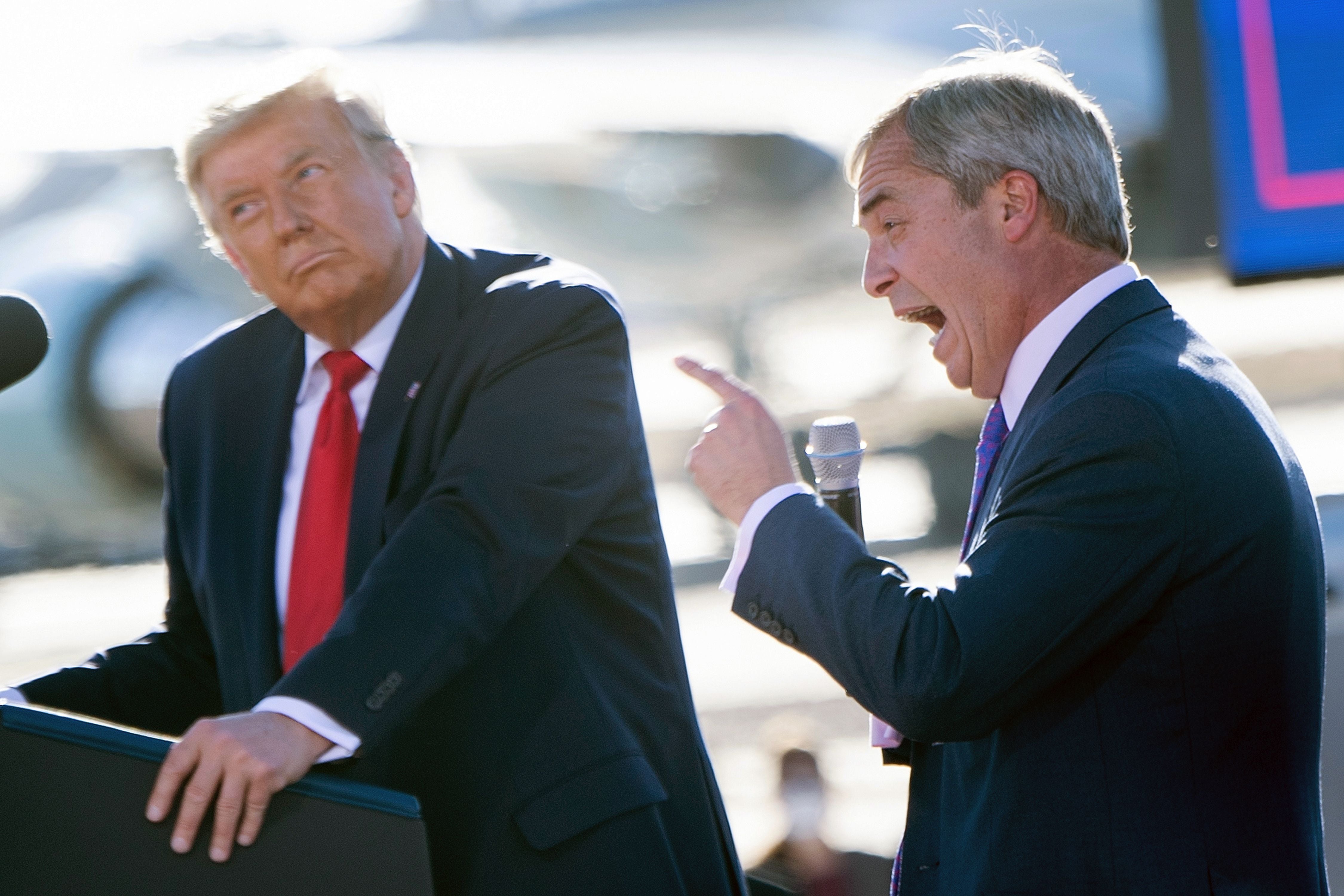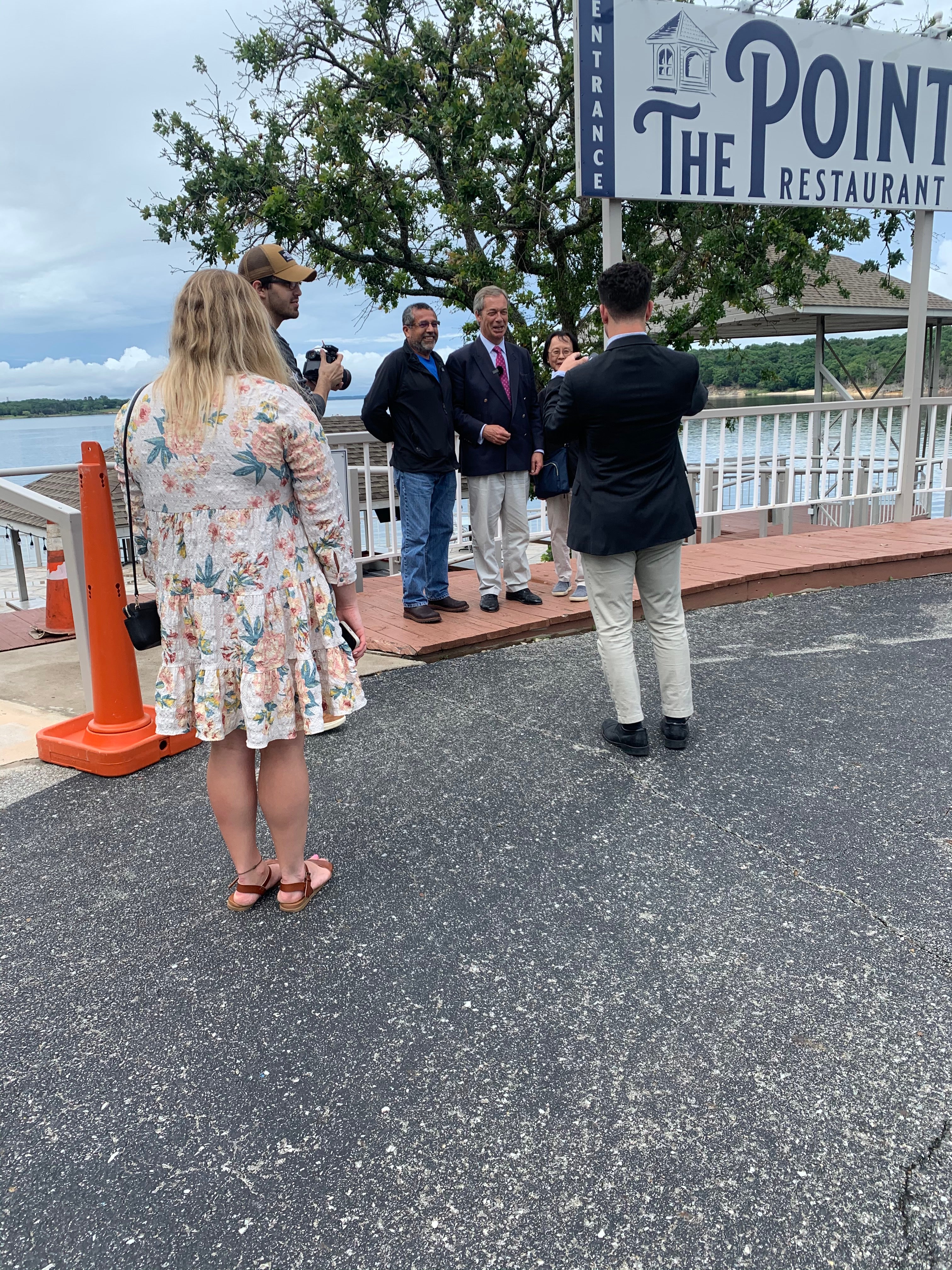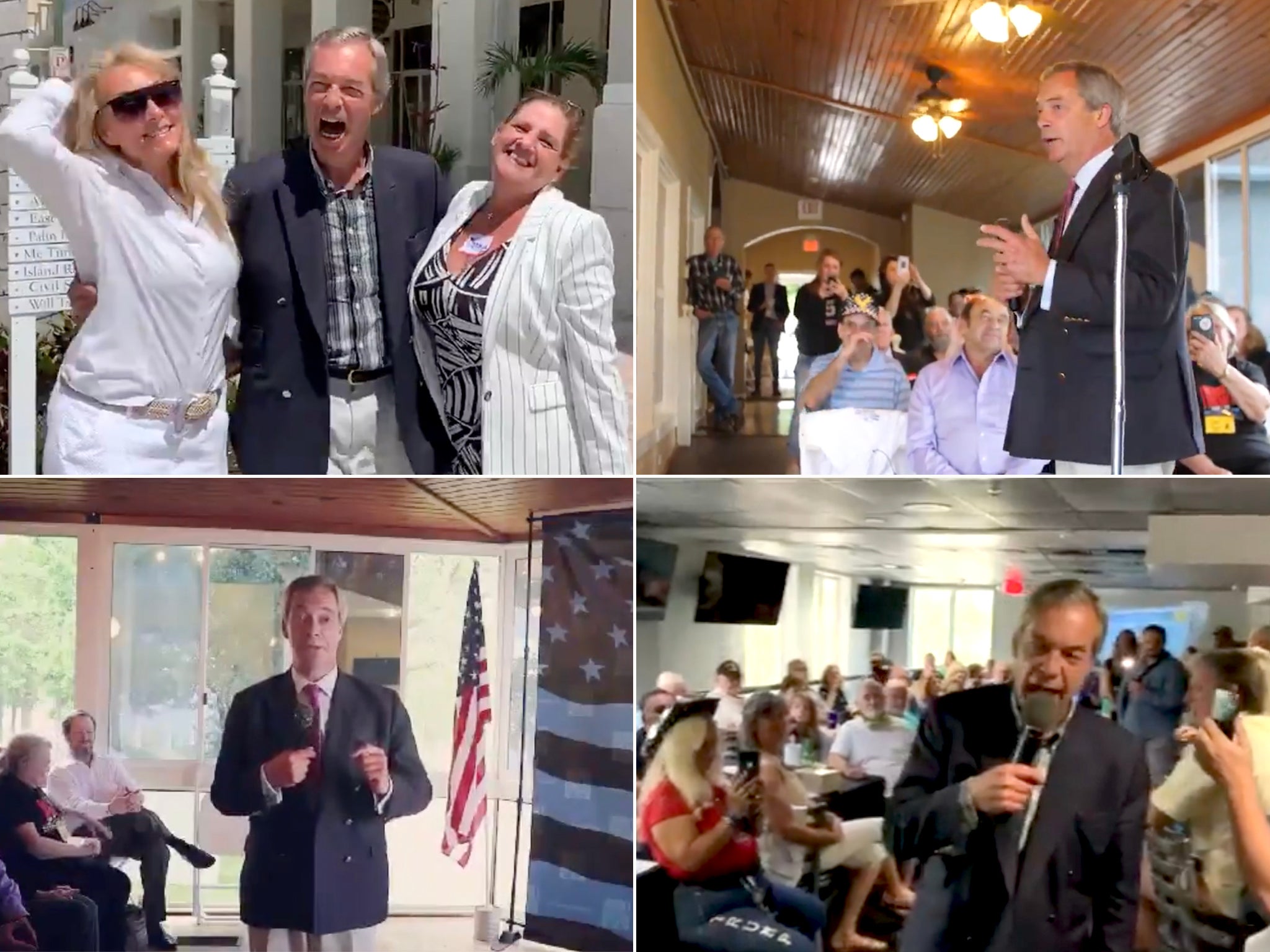Nigel Farage: What does the American right want with the self-proclaimed ‘Mr Brexit’?
Not too long ago, he was welcome in the Oval Office. Now the former Ukip leader is touring half-filled halls and restaurants across America, touting a conservative future. But why? Holly Baxter visits Denison, Texas, to ask the man himself


On a sunny patio at Grandpappy Point, a quaint, middle-of-nowhere restaurant at the edge of a small Texan town, Nigel Farage is telling me about his friendship with Donald Trump. “I’ve been down to Mar-a-Lago a couple of times,” he says, “and I never tell anyone what he tells me, and that’s why he trusts me. But I can tell you what I told him. I said, ‘If someone else comes along [in 2024] with the same amount of charisma as him, that’s fine. But at the moment I can’t see who that is.’”
It is an hour before the start of the seventh event of “America’s Comeback Tour with Nigel ‘Brexit’ Farage”, in Denison, Texas, a small town near the Oklahoma border on the picturesque Lake Texoma. Here, abandoned lots and boarded-up houses rub shoulders with palatial vacation homes; in the community where many join the military to escape poverty after graduating from high school, wealthy residents from the nearby city of Dallas buy up ranch-style homes and park their boats outside. A couple of miles out from where Farage is speaking, an ancient Family Video store implores passers-by to enquire on the door about taking over the lease. Industrial estates advertise cheque-cashing shops and dollar stores.
The “comeback tour” has not been received in the way Farage may have hoped. Earlier dates attracted just a handful of people, leaving embarrassing photographs of sparse hotel conference rooms to circulate on social media on both sides of the Atlantic and become liberal meme fodder. The links to book free tickets to the events on the tour were circulated among British left-leaning accounts, leaving organisers with a real-life turnout far short of their projected audience. It was a similar scene to what TikTok fans had achieved during Trump’s rallies in 2019 and 2020, which led to the then-president turning up to events with thousands of empty seats and deserted bleachers. There were reports that Farage’s tour organisers, FreedomWorks, feared they had “overestimated” his popularity. And Farage himself waded in on the PR disaster, writing in The Telegraph that he was the victim of “cancel culture” and that “hard-left agitators” were trying to silence him from across the Atlantic.
Here at Lake Texoma, though, he is among friends. White-toothed, square-jawed American twentysomethings in shirts and suit jackets construct a right-wing forcefield around him, stepping in my way every time I try to approach. “Who are you again?” they ask, hard smiles on their faces, before shooing Farage back to a private area of the restaurant. “What media did you say you represent?” Meanwhile, more of their ranks emerge from SUVs outside; a woman runs across to join in, reminding everyone that they have met before at an event “with Steve Bannon” before being welcomed into the fold.
Some of the cities chosen for “America’s Comeback Tour” seemed like no-brainers: Tulsa, Cincinnati, Pittsburgh, San Antonio. Others left me scratching my head; what was there for “Mr Brexit” in Perrysburg, Ohio; Elmhurst, Illinois; or Jackson Hole, Wyoming? What, indeed, is there for him at this white-picket restaurant 70 miles from the nearest big city? I ask people on the streets, in Dallas and nearby Plano and Denison, if they have heard of Farage or even Brexit, and almost all of them respond: “No, ma’am.” One tells me he knows Brexit as a “xenophobia thing that was about keeping the immigrants from getting to England”, but adds that he clearly isn’t a part of Farage’s target demographic.
Speaking to those who have gathered for the event at Grandpappy Point, however, makes everything a little clearer. One woman, salad fork held aloft to punctuate her points, tells me that Farage is “like Churchill, a maverick”, and that she is “depending on him to keep this boat afloat”. Which boat does she mean? “Western civilisation,” of course: “He’s getting rid of the globalists. Some Republicans are just as bad as the Democrats. It’s the establishment that’s the problem.” She gesticulates towards my face mask, which is on the table beside me: “I see you’ve got a mask. It’s all about control. They want you to live in fear.” A couple of tables away, an elderly couple lean over to say they agree.

What leads a well-dressed, middle-aged woman in Texas to become enamoured with Farage, an unelected British politician taking most of the credit for an intra-Europe issue? “I’m part of the Texoma Patriots,” she tells me. “I get emails. Also, my son is a captain in the army and he told me about this stuff.” She tells the teenage waiter to follow Farage too, because “he’s challenging the new world order”.
‘We just want everyone to leave us alone’
A captain in the army eschewing “the establishment” and protesting against global expansionism might seem oxymoronic, but the American far right is known for such contradictions. Pro-policing “Blue Lives Matter” flags often fly at “freedom-focused” rallies that offer a platform to speakers who want less state intervention. A smartly dressed businessman at Farage’s event tells me that he’s a libertarian – “Round here, we just want everyone to leave us alone” – even as the evangelical Reverend CL Bryant, star of the radio show A Conservative Voice for America and Farage’s co-speaker on the tour, rants onstage behind him about how “the sanctity of marriage” has been taken away by Democrats. Does a libertarian really have enough in common with a hardline evangelist to join the same movement, I ask my freedom-loving friend who just wants Texas to be left alone? “Well,” he says, “we have to make compromises.”
Farage tells me that he has chosen to go on the tour because its sponsor, FreedomWorks, is “bringing conservative groups together” and that he’s “just a massive believer that grassroots politics is very effective”. The part about bringing groups together rings true. Milling around the event are elderly women in T-shirts emblazoned with Farage’s face; activists handing out postcards saying “Thank you for your courage” to send to Donald Trump; parents with children in “Make America Great Again” hats; and a banner for the aforementioned Texoma Patriots (“Taxed Enough Already!”). In other words, the place is packed with small, local groups and their representatives, a number of whom approach me because they don’t recognise my face. Rather than an event which has been marketed to locals who might be interested in the issues and the man, it feels like the result of weeks of targeted recruitment.

In many ways, that shouldn’t be surprising. Though FreedomWorks refers to itself as a grassroots organisation, and Farage professes his admiration for it on this basis, it’s long been accused of “astroturfing” – creating the impression of a groundswell of public opinion – and taking large sums of corporate money. Rather than spontaneously garnering the admiration of people in small towns across the US, many might say FreedomWorks instead targets, creates and bolsters conservative groups in an effort to organise them in a way that is convenient to the politicians they work with. (Organisers hit by these accusations, on the other hand, would claim these protests simply highlight people’s real concerns.) Two of the most prominent Republicans to have spoken about their work with the group are senators Mike Lee of Utah and Rand Paul of Kentucky, both of whom Farage refers to during his speech as his “good friends”. He also tells me that he has recently met with the far-right student organisation Turning Point USA, where “Charlie Kirk’s done a brilliant job”. Kirk is a 28-year-old, who founded the student group in 2012 alongside a man in his 70s named Bill Montgomery; it runs a “professor watchlist” that vows to “expose” college professors and schoolteachers who “advance leftist propaganda in the classroom”.
As far back as 2013, Mother Jones was referring to FreedomWorks as a “powerful Tea Party group” that “bills itself as a grassroots outfit” but is “bankrolled mostly by big-money donors”.
‘We’re like sheep being led to the slaughter’
CL Bryant, the reverend who has travelled on the American Comeback Tour alongside Farage, is a senior fellow with the Washington DC arm of FreedomWorks. A strident, forceful speaker, he provides an energetic wrestling-style introduction for Farage, and later quotes scripture while railing against gay marriage and the desecration of gender norms. “Friends, listen to me – my Caucasian friends in particular,” says Bryant, who is Black. “You didn’t use to be sheepish. You didn’t use to let people push you around. What is happening to us? We’re being led like sheep to the slaughter.” Later, he adds that he opposes educational initiatives like the 1619 Project, and that education is dangerous: “Send them off to college and then sitting opposite you, lo and behold, is Karl Marx.”
It seems clear that Farage thinks he is achieving celebrity status by joining forces with FreedomWorks, Turning Point USA and the likes of Trump and Steve Bannon, but the event in Denison feels like the dying throes of a movement that knows it is coming to an end. There are Trump hats as far as the eye can see, and tables of people talking about how “funny things happened in Georgia during the election”, but outside Grandpappy Point, the rest of the world has moved on.

“There are huge questions over mail-out ballots,” Farage says to me on the patio. “I’m not using the word fraud; I’m just saying mass mail-out ballots are not particularly reliable. Never have been… I’m sure there were irregularities on a huge scale.” And though most of us have become used to Farage saying the most controversial thing that pops into his head, I’m surprised to hear him partially subscribe to what has become widely referred to in the US as the “Big Lie”: the belief that the 2020 election was stolen from Trump by a highly organised group of ballot-dumpers and thieves. It’s the Big Lie that powered sentiments behind the 6 January insurrection at the Capitol, during which five people died. And it’s the Big Lie that has empowered the further-right elements of Congress – the Marjorie Taylor Greenes and Mike Lees of this world – many of whom have flirted with QAnon conspiracy theories about secret messages from outside “the swamp” and the dark machinations of “globalists”. Hitching your wagon to the Big Lie is a big deal, even for someone like Farage.
And yet it is clear that six weeks in a far-right American echo chamber have gone to his head. “This is the complete opposite of what Martin Luther King wanted,” he tells me, with no sense of irony. “Martin Luther King wanted us to be judged as people, not as being Black or white or Hispanic, and now everyone’s being divided up, and there’s a lot of fear of what that might lead to.” It’s reminiscent of some of Trump’s more deluded rants. Farage has clearly taken on that style of speech himself, asking me where I’m from (Newcastle) then immediately telling me that “these working-class people living in the same part of the country you’re from aren’t actually ashamed [of the British empire and British history]. They’re actually bloody proud of what their great-grandfathers did in the Durham Light Infantry or whatever else it was.” A privately educated white man from the south of England proclaiming that he knows what Martin Luther King and my family in northeast England want politically is quite something, but anything’s possible in Texas.
‘Victory is never easy’
Farage is useful to FreedomWorks insofar as he represents a “victory” for conservatism against “the liberal elite”, and he’s good at spinning that narrative. He speaks to a special kind of right-wing American paranoia: one that seeks media approval, and professes freedom of speech as its highest goal, but also relentlessly attacks the free press as part of some shady conspiracy. “Every attempt was made in polling to make us think we’d made a mistake,” he tells the crowd in Denison about the days leading up to the Brexit referendum. No longer is he claiming that the media never saw Brexit coming because it was out of touch with the everyman on the street; the explanation has morphed into a full-blown conspiracy theory, in which murky operatives tried to demoralise conservatives through information warfare. That fits nicely with the crowd, who give a standing ovation when Bryant yells into the microphone that Trump is “the only legitimate president”, and boo at the mention of Obama’s name.
The times when Farage’s hubris gets the better of him, though, are the most telling. At one point, he claims that “everyone thinks” Tea Party activism began in 2009 and 2010, but “I was doing it 17 years before”. The response is muted. He tries to get cheers for his blue passport, but has to do a lot of overexplaining to get his point across, and enthusiasm runs out. A few people in attendance forget his name mid-conversation with me before the event, despite professing their enthusiasm for “the Brexit guy”. And at the end of his speech, the claps morph quickly into a standard-issue chant of “USA! USA!” as if none of his points about international collaboration and freeing the British working class have been made at all.
FreedomWorks is a large and powerful organisation, and Farage no doubt has his uses to it in the short term. As he says himself, he is there to provide some “optimism” to those disappointed by Biden’s win in 2020. Whether his star will continue to rise after this weekend, when America’s Comeback Tour – which actually only features about 15 minutes of him speaking during two hours – comes to an end, is somewhat less certain. A more cynical journalist might say that he doesn’t know what he’s getting into, and that the smiling people he’s allied himself with won’t hesitate to chew him up and spit him out once they’re ready to move on to bigger things.
Either way, though, it’s clear that Mr Brexit himself is having fun in the limelight. When I ask him whether he was really happy with the way Brexit turned out in the end, he says simply that “victory is never easy”. Gazing out among the angry Trumpists galvanised by a Biden win into turning up to see him and his co-star, he says, with a smile: “Sometimes losing’s easier.”
Join our commenting forum
Join thought-provoking conversations, follow other Independent readers and see their replies
Comments
Bookmark popover
Removed from bookmarks